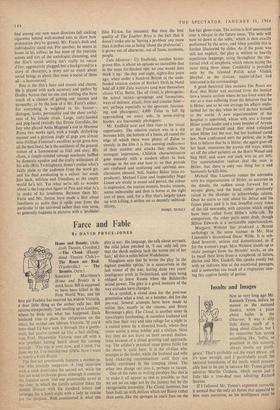Farce and Fable
By DAVID PRYCE-JONES Home and Beauty. (Ash- croft Theatre, Croydon.) —The Cloud. (Hamp- stead Theatre Club.)— The Roses are Real. (Vaudeville.) — The Brontës. (Arts.)
SOMERSET MAUGHAM'S
Home and Beauty is a stock farce. Bill is supposed to have been killed in the First World War, and his best pal Freddie has married his widow Victoria, a dear little thing as the author calls her. Bill returns unexpectedly, 'just tootling up to London,' where he finds out what has happened. Each husband tries to place the obligations on the other, for neither can tolerate Victoria. 'If you'd been dead I'd have seen it through like a gentle- man, but you've turned up like a bad shilling,' says Fred. Meanwhile Victoria runs off with a war profiteer having heard about his coming peerage: The war is over now, and I think I've done my bit. I've married two DSOs. Now I want to marry a P.olls-Royce.'
The first act prominently features a mother-in- law who scarcely reappears. A long interview with a cook dominates the second act, while the last act is an irrelevant gloss, although it contains the funniest scene, and one presumably novel at the time, in which the family solicitor fakes the double divorce • with his standard letters and arranges for a hotel night with a lady he retains for Ole purpose. Well constructed, is what this play is not : the language, the talk about servants, the mild jokes patched in, 'I can only tell you that the shock entirely took the waves out of her hair,' all this is miles below Wodehouse.
Maugham says that he wrote the play 'in the highest possible spirits,' in a sanatorium in the last winter of the war, having done two years' intelligence work in Switzerland, and then being obliged to leave Russia when the Bolsheviks seized power. The play is a good measure of the way attitudes have changed.
As a symbol, a cloud does for the post-war generation what a trial, or a bomber, did for.the pre-war. Several attempts have been made to utilise this, mostly in the cinema, and Barry Bermange's play, The Cloud, is another essay in apocalyptic foreboding. A nameless husband and wife lose their way and take refuge for a night in a ruined tower by a deserted beach, where they come across a stray soldier and a civilian. Next day they do not leave on their several destina- tions because of a cloud growing and approach- ing. The soldier's practical steps prove futile for the shore is quite bare. It is the civilian who emerges as the leader, while the husband and wife hold bickering recriminations until they are finally enveloped in the creeping cloud. The other two plunge out into it, perhaps to escape.
One of the rules in writing parables like this is to make it all appear as real as possible, so that we are set on edge not by the fantasy but by the recognisable normality. The Cloud, however, has been built up with.devices which are flimsy rather than eerie, like the sponges in one's face on the
fun-fair ghost-train. The action is first announced over a relayer in the future tense, 'The wife will now sit down at the table,' which is then exactly performed by the actor, and when possible this is further illustrated by slides. As if the point was still not explicit, the play is written in heavily repetitious language, using throughout the rhe- torical trick of anaphora, which means saying the same thing three times. Credibility is provided only by the talented Polish actor Vladek Sheybal, as the civilian, matter-of-fact and interested in his surroundings.
A good theatrical idea sustains The Roses are Real, that Hitler was secreted from the bunker
into a lunatic asylum where he has lived since the war as a man suffering from the delusion that he is Hitler, and so he can arrange his affairs undis- turbed for the day when he will declare himself to the world. A new superintendent of the hospital is appointed, whose wife was a former
Hitler youth leader and a keen breeder of Aryans at the Frankenwald stud. Her mind collapsed when Hitler lost the war, but her husband cured her. Now confronted with the patient, she is the first to believe that he is Hitler, she again goes off her head, reassumes the joyous old ways, which set off the other patients on the Horst Wessel and Sieg Heil, and scare out such wits as are left. The superintendent realises that the man is Hitler, that there is only one thing for it and humanely he kills him.
Micheal Mac Liammoir rouses the adrenalin with his impersonation of Hitler, so accurate in the details, the sudden stoop forward for a myopic glare, and the hand rather preciously raised to the shoulder to acknowledge salutes. Once he starts to rant about his defeat and his future plans, and it is that dreadful crazy voice of the old newsreels, with opinions which might have been culled from Hitler's table-talk. By comparison, the other parts seem drab, though Hilton Edwards is a serviceable superintendent.
Margaret Webster has produced a Brontd anthology in the same manner as Mr. Mac Liamm6ir's dramatised Oscar Wilde. It is sub- dued however, serious and domesticated, as if for the women's page. Miss Webster stands up to recite passages from the Brontës' works, or sits to recall their lives from a scrapbook of letters, diaries and Mrs. Gaskell. She speaks evenly but with an indrawn hiss at the emotional passages, and is somewhat too much of a ringmaster tam- ing this captive family of genius.






































 Previous page
Previous page